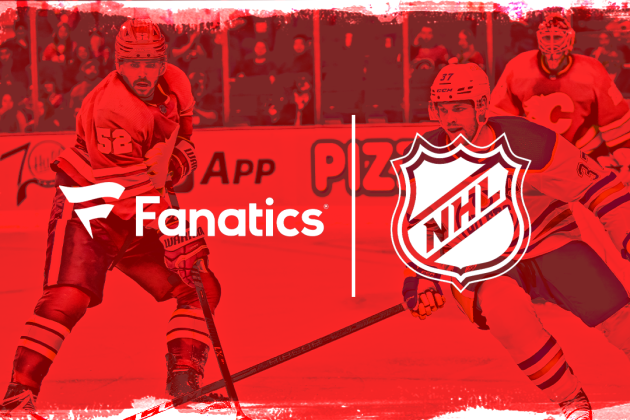Fanatics to Make NHL’s On-Ice Jerseys, a Company First

Fanatics is expanding its relationship with the NHL to include the authentic jerseys worn by players and referees on the ice, a significant step forward for the company’s branded apparel.
Under the new 10-year agreement, Fanatics will become the league’s official uniform provider, starting with the 2024-25 season. Making performance apparel isn’t new ground for Fanatics—the company acquired MLB jersey provider Majestic in 2017 and currently makes Nike’s official baseball uniforms—but this will be the first time that top-tier professional athletes compete during games in the Fanatics logo.
More from Sportico.com
Sporticast: MLB Valuations Feel Strain of Bally Sports Network Bankruptcy
Sporticast: Could Disney Poach NBA Commissioner Adam Silver?
Adidas Prevails With 'Authentic' NHL Jersey Lawsuit's Dismissal
That’s a milestone for the company, which has gradually become more fan-facing after years powering the industry from behind the scenes. Fanatics is well-known among fans for its e-commerce presence, since it runs the online stores for all the major leagues and many of its teams, but remains less-known for its own product.
“The fact is that we have a multi-billion-dollar apparel creation business, but people don’t necessarily know all of our strengths and capabilities on that front,” Doug Mack, CEO of Fanatics Commerce, said in an interview. “So for our brand to be associated with a really advanced technical product, that begins to stretch the bounds of what people understand as the full capabilities behind Fanatics.”
It’s also yet another frontier in the company’s expansion into nearly every aspect of the licensed sportswear economy. Fanatics’ 18-year-old relationship with the NHL, which dates back to its days operating under the name GSI Commerce, shows how Michael Rubin’s company has become the industry’s dominant player by gradually adding rights, sharing equity, expanding categories and increasing its own brand presence. Here’s a brief timeline of that relationship:
2005: GSI Commerce, which would become Fanatics six years later, inks an e-commerce deal to manage the online shops of the NHL and all of its teams, and also to publish and mail the league’s annual catalog.
2009: The GSI deal is expanded in a new 10-year agreement, which grants the company new rights, including customized shirts and sweatshirts.
2015: Washington Capitals star Alex Ovechkin becomes the first NHL player to sign an exclusive memorabilia deal with Fanatics. The stable now includes more than 80 current and former stars, such as Auston Matthews, Nathan MacKinnon and Igor Shesterkin.
2016: Fanatics, at this point the world’s largest seller of licensed sports merchandise, expands its NHL relationship to include its own brand for the first time. The sixteen-year partnership makes the Fanatics brand the outfitter for NHL fan jerseys (a first for Fanatics). It also gives the Fanatics brand rights to on-ice championship apparel, and exclusivity for “hot market” moments. Fanatics also gains the right to operate on-site retail at marquee events like the All-Star Game and Winter Classic.
2017: Fanatics launches the NHL’s new Canadian e-commerce platform. Separately, the NHL invests in Fanatics as part of a $1 billion round.
2018: Fanatics adds the “authentic pro” merchandise line, which includes performance apparel and headwear that players wear during practice and training.
2021: Fanatics, through its Lids unit, opens a new flagship NHL store in New York City.
2022: Retro apparel brand Mitchell & Ness, which Fanatics bought earlier that year, adds rights to all 32 NHL teams.
The relationship has evolved in three major stages, according to Brian Jennings, the NHL’s executive vice president of marketing. It began with e-commerce, then spread to include Fanatics’s commitment to speed and distribution, and most recently, grew to include performance product in the locker room. He said each evolution gave the NHL faith that Fanatics could deliver on the next one.
“[Authentic on-ice] jerseys are a logical next step for us,” Jennings said in an interview.
The rights came up when Adidas, which has been the NHL’s jersey outfitter since 2017, declined to pursue a renewal. While Mack and Jennings both declined to comment on the financial specifics of the new deal, which is an amendment to the existing relationship, Mack said there’s an additional “exposure fee” associated with having your own logo on the ice. There’s likely also improved economics for Fanatics in making and selling its own authentic jerseys, as opposed to making authentic uniforms on behalf of a company such as Nike.
Michael Rubin’s company has spent much of the last two years expanding into new verticals beyond its commerce business, including sports betting, trading cards and collectibles. The company raised money in December at a $31 billion valuation (all 32 NHL teams are worth $32.4 billion, according to Sportico’s numbers).
Fanatics will keep much of the same infrastructure and brainpower in place from Adidas’ jersey process, something Jennings said was important to the NHL. The company has hired both Dom Fillion, who led the design for the Reebok and Adidas authentic NHL jerseys, and Keith Leach, whose prior stops include CCM, Reebok and Adidas. Leach is Fanatics Brands’ NHL VP/GM; Fillion is the creative director.
Fanatics has also already contracted with the same Canadian factory that handles the late-stage manufacturing of the Adidas uniforms.
“We don’t feel the need to change all the core building blocks, because the current product is a good product,” Mack said. “What we want to do is to bring our innovation, agility and some design updates… This isn’t reinventing the wheel. It’s the best of both worlds.”
Adidas’ authentic jerseys were subject to a recent lawsuit by a Florida resident who claimed that the company was engaged in unlawful marketing because the jerseys sold to the public were not identical to the ones worn on ice by the players. That lawsuit was dismissed by a judge earlier this month, in part because the jerseys were purchased from Fanatics, not Adidas, whose logo was on the sweater.
Best of Sportico.com
